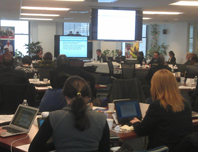 The Office of ECOSOC Support and Coordination (OESC), in collaboration with the Division for Sustainable Development and the Capacity Development Office of UN DESA, organized a Training Workshop and Expert Group Meeting in preparation for the 2014 Annual Ministerial Review of the UN Economic and Social Council (ECOSOC) at UN Women Headquarters in New York on 16-17 December 2013.
The Office of ECOSOC Support and Coordination (OESC), in collaboration with the Division for Sustainable Development and the Capacity Development Office of UN DESA, organized a Training Workshop and Expert Group Meeting in preparation for the 2014 Annual Ministerial Review of the UN Economic and Social Council (ECOSOC) at UN Women Headquarters in New York on 16-17 December 2013.
The 2014 AMR theme will focus on “Addressing on-going and emerging challenges for meeting the MDGs by 2015 and for sustaining development gains in the future”. It will be the first review to be held under the revised structure of ECOSOC and to be convened in tandem with the High-Level Political Forum (HLPF) meeting under the auspices of ECOSOC. It will provide Member States with an opportunity to reflect on new approaches to review and assess progress towards the MDGs and sustain results in the context of the follow-up to Rio+20 and ongoing deliberation on the post-2015 development agenda.
The objectives of the event were to: a) increase knowledge of the prevailing issues captured by the AMR theme for next year; b) identify key priority areas to be addressed by the Secretary-General’s report and activities leading up to the 2014 AMR deliberations, and; c) propose new ways to measure development progress building on the experience of the AMR and NVPs.
It brought together representatives and senior experts from member States, UN system partners and independent experts to share expertise and knowledge on the issues to be addressed by the theme of the 2014 ECOSOC Annual Ministerial Review. During the two days, the participants shared experiences and lessons learned from their respective work places or national contexts.
The workshop featured substantive presentations by experts, followed by interactive discussions among participants. The discussions focused on: (i) Role of Institutions in Supporting Sustainable Development; (ii) Inclusive development; (iii) Measuring Development Progress; (iv) Lessons Learned from Existing National Reporting, and; (v) NVP Next Generation: Towards a New Analytical Framework.
The deliberations underscored the fact that strong institutions were a prerequisite for successful development, and that strong leadership was a critical driver and enabler of development. So too, was the need to engage citizen participation and building community resilience. This was seen, together with maintaining effective parliamentary oversight, as an effective system of checks and balances that should operate for governments and the governed in all settings.
Various monitoring and reporting options for a post-2015 framework were examined, which should include setting appropriate targets and indicators, identifying measurement tools that are qualitative and quantitative, addressing the role of women and combining local, national, regional and global applicability. Strong monitoring and evaluation features, through a mutual review system, should be central to ECOSOC’s oversight responsibility, with follow up implementation and report-back mechanisms. Continuous capacity building programmes should be designed for MDG acceleration and implementation of the new development framework.
Participants found the workshop to be important in understanding key concepts in the lead-up to the 2014 AMR and in building on the existing strengths of the National Voluntary Presentations. They underscored the need for a new analytical framework for the next generation of National Voluntary Presentations.
For more information:
United Nations Economic and Social Council (ECOSOC)

